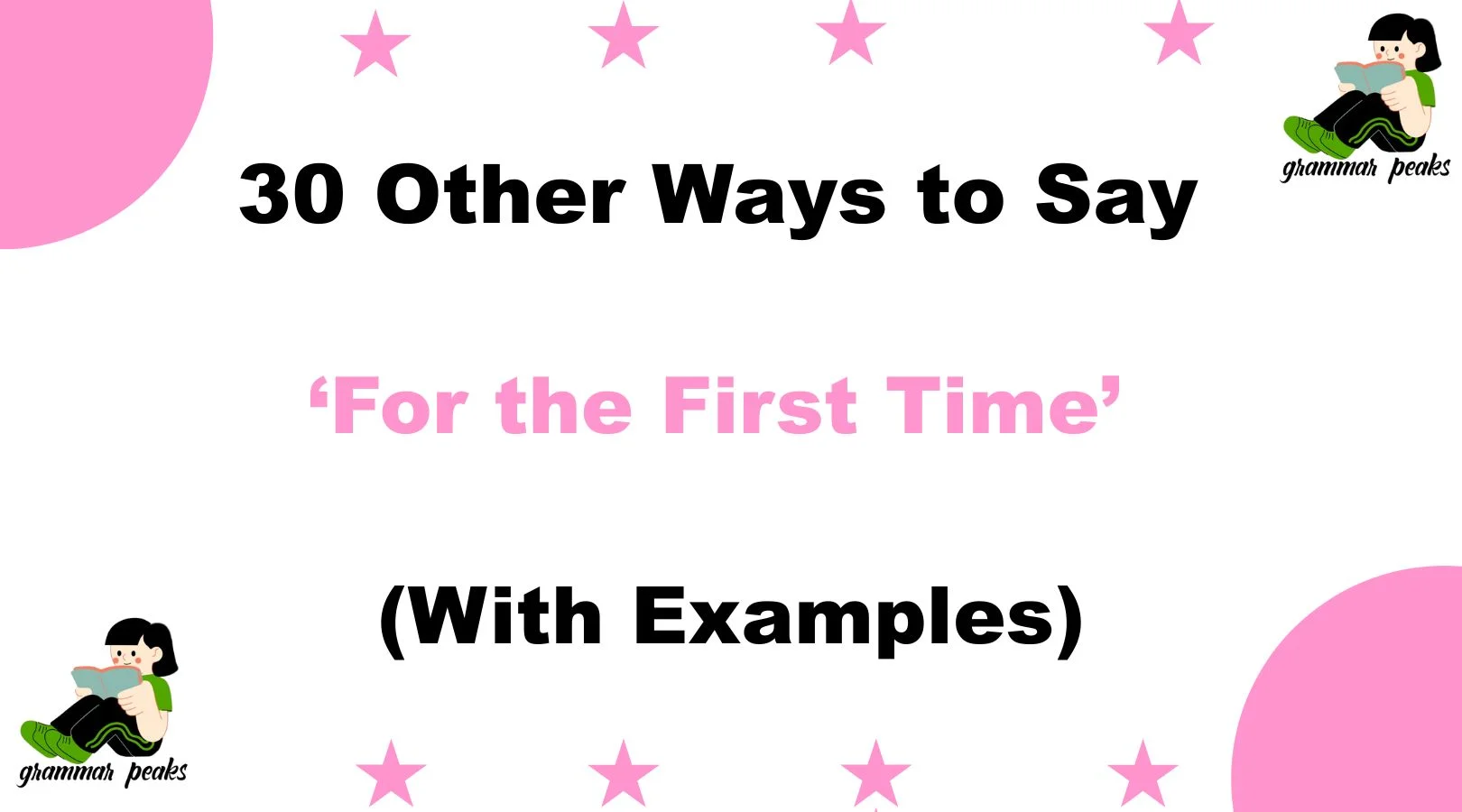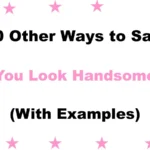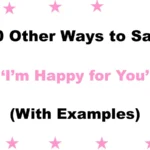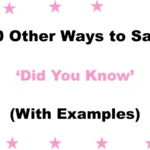Finding the right words often means the difference between a message that lands with emotion and one that gets overlooked. Saying “for the first time” can carry deep emotional weight—whether you’re describing a new experience, recalling a cherished moment, or expressing a personal breakthrough. But sometimes, those exact words might not feel quite right. That’s where thoughtful alternatives come in.
Whether you’re writing a heartfelt message, journalist, or having a meaningful conversation, these alternatives help you be more expressive, personal, and clear. Let’s explore 30 ways to say “for the first time”—each crafted with care and paired with context to help you communicate with empathy and precision.
What Does “For the First Time” Mean?
The phrase “for the first time” means that something is happening or being experienced at no prior point in the past—it’s a brand-new event or occurrence. It highlights the initial moment someone does or sees something, often carrying emotional weight or significance. For example, saying “She travelled abroad for the first time” emphasises that it’s her first-ever experience doing so. This phrase can apply to a wide range of situations—from personal milestones and discoveries to historical events—marking them as fresh, original, or unprecedented.
When to Use “For the First Time”
You should use “for the first time” when you want to emphasize that an action, event, or experience is occurring for the very first instance in someone’s life or in history. It’s often used to highlight a new beginning, a breakthrough, or a meaningful change. For example, in storytelling or conversation, you might say, “I tried sushi for the first time last weekend,” to show that it was a unique, never-before-had experience. It’s also common in writing to stress milestones, such as “The company turned a profit for the first time in five years.” The phrase helps add emotional impact or chronological clarity to your message.
Is It Professional/Polite to Say “For the First Time”?
Yes, it’s perfectly professional and polite.
In formal writing, it’s clear and communicates chronology well. In casual or emotional contexts, it adds a personal touch to your story or statement. Just ensure it fits the tone and context of your message.
Pros and Cons
Pros:
- Universally understood
- Emotionally relatable
- Works in both professional and personal settings
Cons:
- Can feel repetitive in writing
- Might lack creative flair if overused
- Doesn’t always express depth of the event
Synonyms for “For the First Time”
- Initially
- At the outset
- At the beginning
- From the get-go
- Upon first experience
- Inaugurally
- To start with
- As a beginner
- My first-ever
- On my first try
- Debut experience
- At the start
- Entering new territory
- On the initial attempt
- In the opening moment
- When I first began
- First introduction
- Fresh out the gate
- On the threshold
- In the early days
- During my first encounter
- Venturing out
- On day one
- My introduction to
- The first taste
- At first glance
- Brand-new to me
- Breaking new ground
- As a first-timer
- At square one
1. Initially
Definition: At the beginning or start of a process or action.
Detailed Explanation: Often used in formal or structured writing, “initially” conveys that something happened at the earliest stage.
Scenario Example: “Initially, I wasn’t sure I’d enjoy public speaking.”
Best Use: In academic, business, or logical storytelling contexts.
Worst Use: Avoid emotional or nostalgic reflections—feels a bit detached.
Tone: Neutral and formal.
2. At the Outset
Definition: From the very start of an event or process.
Detailed Explanation: This phrase adds a slightly formal or historical tone, implying the moment when something began.
Scenario Example: “At the outset, we had no idea how successful the project would be.”
Best Use: Project descriptions, business retrospectives, formal writing.
Worst Use: Personal storytelling—may sound too cold or rigid.
Tone: Formal and reflective.
3. At the Beginning
Definition: The initial part or early phase of something.
Detailed Explanation: Commonly used in all types of communication to denote the start of any event or story.
Scenario Example: “At the beginning of our relationship, everything felt magical.”
Best Use: Everyday storytelling, casual writing, or personal reflections.
Worst Use: Not ideal for scientific or structured analysis.
Tone: Warm and conversational.
4. From the Get-Go
Definition: Right from the start; immediately from the beginning.
Detailed Explanation: An informal and energetic way to express that something started early or from the start.
Scenario Example: “She impressed us from the get-go.”
Best Use: Conversational, friendly, or casual writing.
Worst Use: Not suitable for formal or academic contexts.
Tone: Playful and informal.
5. Upon First Experience
Definition: The moment someone encounters something new.
Detailed Explanation: This phrase emphasizes the initial reaction or impression of a new event.
Scenario Example: “Upon first experience, skydiving was both terrifying and thrilling.”
Best Use: Personal reflections, journals, reviews.
Worst Use: Avoid in technical writing or where brevity is key.
Tone: Thoughtful and expressive.
6. Inaugurally
Definition: Happening as the first in a series.
Detailed Explanation: Often used in official contexts or events, this word conveys formality and significance.
Scenario Example: “He spoke inaugurally at the conference’s first session.”
Best Use: Ceremonial, official, or formal settings.
Worst Use: Too stiff for casual use or daily conversations.
Tone: Formal and prestigious.
7. To Start With
Definition: Used to describe the beginning point of an action or series of events.
Detailed Explanation: This phrase is friendly and straightforward, often signaling the first step in a sequence.
Scenario Example: “To start with, I had no idea how much I’d love painting.”
Best Use: Informal conversations, blog posts, or teaching moments.
Worst Use: Avoid in legal or technical documents—can seem too casual.
Tone: Approachable and relaxed.
8. As a Beginner
Definition: Referring to oneself or another in a first-time or novice position.
Detailed Explanation: Frames the experience from the perspective of learning or starting out.
Scenario Example: “As a beginner, I found coding really overwhelming.”
Best Use: Learning reflections, educational writing, self-growth narratives.
Worst Use: Avoid when describing high-stakes or serious events.
Tone: Humble and introspective.
9. My First-Ever
Definition: Something experienced for the very first time in life.
Detailed Explanation: Adds a personal and emotional flair to the experience, highlighting it as unique and memorable.
Scenario Example: “My first-ever concert was unforgettable.”
Best Use: Personal anecdotes, emotional stories, social media posts.
Worst Use: Avoid in professional documents or academic essays.
Tone: Excited and sentimental.
10. On My First Try
Definition: The very first attempt at doing something.
Detailed Explanation: Emphasizes the action of attempting something just once at the start.
Scenario Example: “On my first try, I actually baked a perfect cake.”
Best Use: Storytelling, learning experiences, achievement reflections.
Worst Use: Avoid when focusing on continued efforts or non-linear growth.
Tone: Proud and enthusiastic.
11. Debut Experience
Definition: A first-time appearance or participation in something new.
Detailed Explanation: Carries a formal or artistic tone, often used in performances or public roles.
Scenario Example: “My debut experience as a speaker was nerve-wracking.”
Best Use: Performance arts, professional beginnings, formal introductions.
Worst Use: Avoid in casual settings—can sound overstated.
Tone: Elegant and polished.
12. At the Start
Definition: At the point when something first began.
Detailed Explanation: Simple and flexible, it provides a temporal anchor in any narrative.
Scenario Example: “At the start, I had no idea what I was doing.”
Best Use: Versatile—works in nearly every context.
Worst Use: May feel too plain for emotional writing unless expanded.
Tone: Neutral and adaptable.
13. Entering New Territory
Definition: Venturing into a completely unfamiliar area or experience.
Detailed Explanation: Conveys boldness and a sense of exploration in a figurative sense.
Scenario Example: “Quitting my job and starting a business felt like entering new territory.”
Best Use: Life transitions, career changes, personal growth moments.
Worst Use: Avoid in literary contexts—best used figuratively.
Tone: Empowering and brave.
14. On the Initial Attempt
Definition: During the very first effort or try at something.
Detailed Explanation: Highlights the first effort without emphasizing success or failure.
Scenario Example: “On the initial attempt, the prototype didn’t function.”
Best Use: Project reflections, trial-based storytelling, experiments.
Worst Use: Too formal for casual chats or friendly stories.
Tone: Technical and neutral.
15. In the Opening Moment
Definition: At the exact start or initial moment of an event or situation.
Detailed Explanation: Adds drama and depth, often used in storytelling or emotional writing.
Scenario Example: “In the opening moment, I realized this was going to change my life.”
Best Use: Dramatic storytelling, emotional essays, memoirs.
Worst Use: Avoid in business writing—can feel too poetic.
Tone: Reflective and powerful.
16. When I First Began
Definition: A personal statement of starting something for the first time.
Detailed Explanation: Often used in retrospective storytelling, it brings personal insight.
Scenario Example: “When I first began writing, I didn’t think anyone would read it.”
Best Use: Personal stories, mentorship, growth narratives.
Worst Use: Too informal for research or instructional texts.
Tone: Warm and introspective.
17. First Introduction
Definition: The initial meeting or awareness of a new experience.
Detailed Explanation: Frames the moment like a gentle unveiling of something unfamiliar.
Scenario Example: “My first introduction to yoga was life-changing.”
Best Use: Lifestyle blogs, health and wellness, journaling.
Worst Use: May sound too vague for factual writing.
Tone: Gentle and informative.
18. Fresh Out the Gate
Definition: Right at the start of something, often implying eagerness or energy.
Detailed Explanation: A vivid, idiomatic way to describe someone starting off energetically.
Scenario Example: “Fresh out the gate, she made an impact.”
Best Use: Energetic writing, motivational talks, startup culture.
Worst Use: Avoid in academic or formal communication.
Tone: Playful and enthusiastic.
19. On the Threshold
Definition: Standing at the start of a new stage or experience.
Detailed Explanation: Carries symbolic and often emotional meaning—a turning point.
Scenario Example: “Standing on the threshold of adulthood, I felt both fear and excitement.”
Best Use: Life milestones, poetry, reflective writing.
Worst Use: Too poetic for casual emails or data-based writing.
Tone: Philosophical and emotional.
20. In the Early Days
Definition: During the first phase or beginning time period of something.
Detailed Explanation: Imparts a nostalgic or historic feeling to the description.
Scenario Example: “In the early days of our company, we worked from a garage.”
Best Use: Storytelling, brand history, memory sharing.
Worst Use: Avoid if exact timelines are necessary.
Tone: Nostalgic and warm.
21. During My First Encounter
Definition: Refers to the very first interaction or experience with someone or something.
Detailed Explanation: This phrase emphasizes a face-to-face moment or initial exposure, making it great for personal or emotional storytelling.
Scenario Example: “During my first encounter with classical music, I felt completely mesmerized.”
Best Use: Personal essays, memories, reflections on new discoveries.
Worst Use: Too personal or specific for broad overviews or technical reports.
Tone: Intimate and descriptive.
22. Venturing Out
Definition: Taking the first step into something unknown or unfamiliar.
Detailed Explanation: Often used to convey courage, risk-taking, or exploration, this phrase has emotional depth and forward momentum.
Scenario Example: “I was nervous about venturing out on my own after college.”
Best Use: Life transitions, advice columns, motivational writing.
Worst Use: Avoid in strictly factual or formal documents.
Tone: Adventurous and bold.
23. On Day One
Definition: Specifically refers to the very first day something starts.
Detailed Explanation: It anchors a moment in time, often emphasizing readiness, origin, or beginning energy.
Scenario Example: “On day one, I was already excited about the possibilities.”
Best Use: Workplace stories, project recaps, goal setting.
Worst Use: Can feel too literal or stiff for deeply emotional moments.
Tone: Energetic and direct.
24. My Introduction To
Definition: The first time you were made aware of or experienced something.
Detailed Explanation: Emphasizes a gentle beginning or informal initiation into something new.
Scenario Example: “My introduction to photography happened in high school.”
Best Use: Hobbies, personal growth, educational paths.
Worst Use: Not ideal for dramatic or emotional events.
Tone: Friendly and light.
25. The First Taste
Definition: A metaphorical or literal first sampling of something.
Detailed Explanation: Evokes sensory experience, often used to describe an initial moment of pleasure or realization.
Scenario Example: “The first taste of independence came when I moved out.”
Best Use: Narratives, creative writing, metaphoric language.
Worst Use: Too poetic for technical descriptions or formal updates.
Tone: Evocative and emotional.
26. At First Glance
Definition: Describes an initial impression or reaction.
Detailed Explanation: Used when something immediately stood out or created an impact during the first moment.
Scenario Example: “At first glance, the book didn’t seem interesting—but I was wrong.”
Best Use: Reviews, first impressions, judgment reflections.
Worst Use: Not suitable for chronological storytelling.
Tone: Analytical and thoughtful.
27. Brand-New to Me
Definition: Completely unfamiliar or never before experienced.
Detailed Explanation: Adds personal and casual emphasis to a first-time event.
Scenario Example: “This type of cuisine was brand-new to me.”
Best Use: Social posts, diaries, everyday conversations.
Worst Use: Too informal for business communication.
Tone: Casual and genuine.
28. Breaking New Ground
Definition: Doing or trying something for the first time—often with innovation or risk.
Detailed Explanation: This idiom conveys progress, courage, or pioneering spirit.
Scenario Example: “We were breaking new ground by launching a product in a foreign market.”
Best Use: Entrepreneurship, innovation, career storytelling.
Worst Use: Feels too dramatic for small, personal firsts.
Tone: Ambitious and driven.
29. As a First-Timer
Definition: Being someone who is doing something for the first time.
Detailed Explanation: Highlights the inexperience or excitement of someone entering a new situation.
Scenario Example: “As a first-timer, I was nervous about hiking that trail.”
Best Use: Travel writing, event summaries, relatable storytelling.
Worst Use: May sound informal or self-deprecating in serious contexts.
Tone: Friendly and relatable.
30. At Square One
Definition: At the very beginning of a process, often with a sense of starting fresh.
Detailed Explanation: This idiom suggests starting from scratch—sometimes again, sometimes for the very first time.
Scenario Example: “After changing careers, I found myself at square one.”
Best Use: Career shifts, life reboots, motivational pieces.
Worst Use: Avoid if you want to avoid a negative or uncertain tone.
Tone: Reflective and realistic.
Conclusion
Finding alternatives to “for the first time” lets you explore the rich emotional, creative, and situational layers of expression. From playful to profound, from professional to personal, each of these 30 phrases helps you shape your message with more authenticity, clarity, and humanity. Choose a phrase that reflects your intention, context, and the emotion you want to share—because how we say something can be just as meaningful as what we say.
FAQs
1. What Does “For the First Time” Really Mean?
“For the first time” means that something is happening or being experienced for the very first occurrence in someone’s life or within a specific context. It marks a beginning, often carrying emotional or memorable significance. This phrase highlights the novelty and often the impact of a new experience.
2. Is It Okay to Use “For the First Time” in Formal Writing?
Yes, it is completely acceptable to use “for the first time” in formal writing. It’s clear, precise, and universally understood. However, in highly technical or academic documents, consider using alternatives like “initially”, “on the initial attempt”, or “at the outset” for a more polished tone.
3. What’s the Best Alternative to Use in Emotional Storytelling?
For emotional storytelling, try using “my first-ever”, “in the opening moment”, or “the first taste”. These phrases carry personal warmth, sentiment, and vivid imagery—making your stories feel more heartfelt and authentic.
4. Can I Use These Alternatives in Public Speaking or Presentations?
Absolutely! Depending on your tone, you can tailor your language. For professional talks, go with “at the outset” or “on day one.” For motivational speeches, try “breaking new ground” or “venturing out”. Your phrase choice helps set the tone and emotional energy of your message.
5. Why Should I Avoid Repeating “For the First Time” Too Often?
Using “for the first time” repeatedly can make your writing sound monotonous and uninspired. By using synonyms and creative variations, you bring variety, depth, and freshness to your writing or speech—ensuring your message feels engaging, dynamic, and human.






